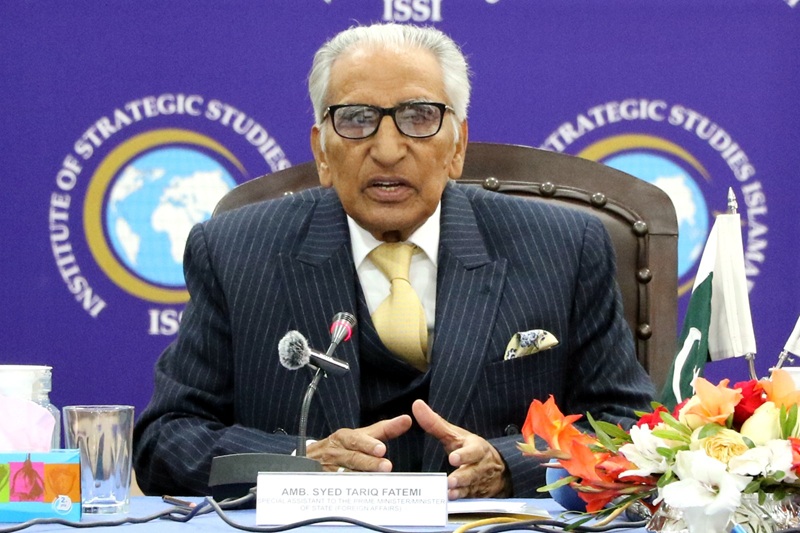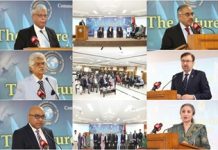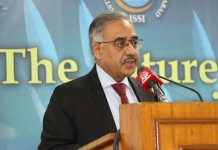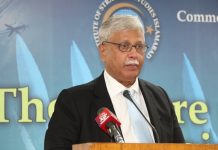Speech by Chief Guest Ambassador Syed Tariq Fatemi,
Special Assistant to Prime Minister/Minister of State (Foreign Affairs), on inaugural of ‘China Corner’ at ISSI
(26 December 2024 at 0930 hrs)

Amb. Sohail Mahmood, Director General, ISSI
Esteemed Guests,
Fellow diplomats
Distinguished colleagues,
Ladies and Gentlemen,
As Salam Aalikum and Good Morning!
It gives me great pleasure to join you this morning at the inauguration of the “China Corner” at the Institute of Strategic Studies, Islamabad.
I congratulate Amb. Sohail Mahmood and his team at the Institute for infusing new life into this important research organization through regular reports, discussions, events and activities that focus on important aspects of our foreign policy.
The establishment of a dedicated “China Corner” at the ISSI Library is a timely step, given the growing interest in this subject and the ever-expanding body of knowledge on China as a topic.
For academics, students and policy practitioners, having access to a repository of information that focuses on the multifarious aspects of China’s magnificent rise and its remarkable growth, is both a blessing and a necessity.
Over the years, China has always been very close to my heart. I have been fascinated with this country ever since my first visit to China in 1972 and that too by the Grand Siberian Railway Line that took six days and night.
Having subsequently served in Beijing for many years, and thereafter, having been part of Pakistan and China’s historic journey through the China-Pakistan Economic Corridor during the last decade, I have had the distinction to witness, up close, how our two countries have come together more closely than ever before.
Ladies and Gentlemen,
China’s rise to the summit of the world, both as a military as well as an economic power, is no miracle. It is the result of decades of hard work and sacrifice of its enterprising people and testament to the vision and outlook of its leadership.
From humble yet proud beginnings under Chairman Mao Zedong, to the transformative leadership under Zhou Enlai and Deng Xiaoping, modern day China under President Xi Jinping has now assumed its rightful place as a great power which ranks as the world’s second-largest economy after having lifted over 800 million people out of poverty.
This is nothing short of a miracle. It is an unprecedented achievement in human history!
Ladies & Gentlemen,
I wish to share with you that in order to understand the China of today, you must study the China of the past.
China’s ascendancy as a great power needs to be seen in its proper historical context.
For millennia, China’s rulers saw their country as a major actor on the world stage, by espousing the concept of the Middle Kingdom, which implies that China is the cultural, political, and economic center of the world.
That is why, Sun Yat-sen, known as the father of modern China, was one of the first to advocate “revitalizing the Chinese nation”, as he aspired for an enhanced role for his country at the international plane.
At present, China’s global outlook is reflected in President Xi’s vision of building a “global community with a shared future.”
President Xi Jinping’s Belt and Road Initiative, of which, the China-Pakistan Economic Corridor (CPEC) is the crown jewel, has already revolutionized the connectivity and development paradigm of our nation as well as our entire region.
Similarly, President Xi’s Global Development Initiative, Global Security Initiative and Global Civilization Initiative, reflect the three priority areas – socio-economic development, security and culture, on which the foundations of the world of tomorrow must be laid.
Ladies and Gentlemen,
China remains a strong advocate for a more comprehensive and multipolar system where principles and purposes of the UN Charter are upheld and advanced.
China’s engagement in global forums such as the United Nations, the World Trade Organization, the G20, SCO and BRICS reflects its commitment to multilateralism and its role as a responsible global power.
It has introduced a new model of global leadership. In this regard, I want to highlight three specific points.
- First, China’s economic growth, powered by its own human and natural resources, has tossed out the traditional mercantile model that long dominated global politics.
- Second, China’s experience has established that there is no “one-size-fits-all” approach when it comes to political Any political system, which enjoys public support and caters to the people’s demands and sensitivities, can bring economic prosperity and social development.
- Third, China’s peaceful rise and its increasing contribution to fostering global development has driven home the point that multilateralism, cooperation and win-win partnerships are still possible in a highly competitive and volatile
Ladies & Gentlemen,
Let me reaffirm that it is a matter of great satisfaction for Pakistan that China, our iron brother, is shaping global governance structures in the most profound and positive ways.
While Pakistan was among the very first countries to formally recognize the People’s Republic of China, on its independence in 1949, today Pakistan-China “All Weather Strategic Cooperative Partnership” is an exemplary model of inter-state relationship. Our two countries have stood by each other through thick and thin and will continue to do so. We support each other’s core issues of national interest and our friendship is an anchor of peace and stability in the region.
As partners in our quest for peace and prosperity, Pakistan and China have accomplished great things together. Among the many success stories of our fruitful cooperation, CPEC is the most prominent, by virtue of its scale and scope.
To further deepen this vital relationship, Prime Minister Shehbaz Sharif undertook a historic visit to China in June this year. It reaffirmed the strategic convergence and trust between the two countries at leadership-level. It also helped to catalyze new avenues of cooperation in diverse areas such as IT, agriculture, industrial development, energy and science.
We also hosted Premier Li Qiang in Islamabad in October this year. His visit reflected the strong and abiding ties of friendship between our two great nations.
Pakistan stands committed to further extending, expanding and upgrading of CPEC in its Phase-II and to achieving its shared objectives for the two countries.
Ladies and Gentlemen,
China is now transitioning from export-oriented economic development to high-end, advanced economy through accelerating technological innovation and environmental sustainability.
China is already breaking new grounds and extending the frontier of human knowledge, especially in the areas of automation, artificial intelligence and renewable technologies.
Most significantly, China wants to partner with the developing world as it works to realize the “Chinese Dream” through sharing of expertise, technology and knowledge.
Distinguished Colleagues,
Let me also stress that any narrative of “bloc politics” and “containment”, are antithetical to the spirit of our times. Today, international relations are too complex to play “zero-sum” games as we encounter myriad global challenges on multiple fronts.
Pakistan has clearly voiced its opposition to any bloc politics or relapse into the Cold War. Forging military alliances and assigning the role of ‘net security provider’ to some countries, at the expense of others, is fraught with grave consequences.
There is much to gain from international cooperation and collaboration and a lot to lose from pursuit of confrontational approaches.
Ladies and Gentlemen,
I would like to conclude by congratulating the Institute of Strategic Studies on maintaining its high standards of scholarship and research.
I wish Amb. Sohail and his team continued success in this latest initiative and encourage one and all to utilize the “China Corner” to foster a better understanding of one of our closest friends and partners.
Thank you!














